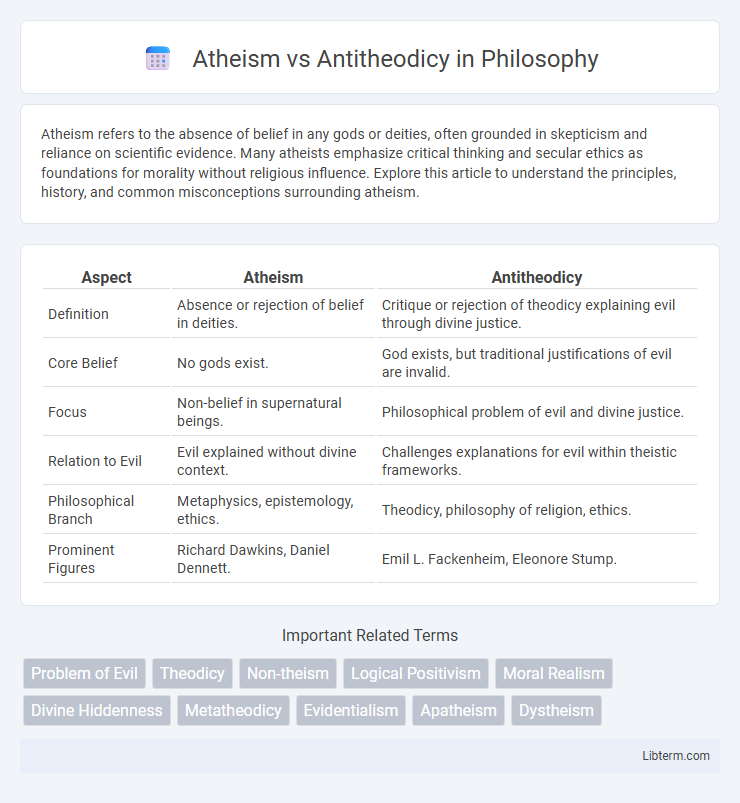Atheism refers to the absence of belief in any gods or deities, often grounded in skepticism and reliance on scientific evidence. Many atheists emphasize critical thinking and secular ethics as foundations for morality without religious influence. Explore this article to understand the principles, history, and common misconceptions surrounding atheism.
Table of Comparison
| Aspect | Atheism | Antitheodicy |
|---|---|---|
| Definition | Absence or rejection of belief in deities. | Critique or rejection of theodicy explaining evil through divine justice. |
| Core Belief | No gods exist. | God exists, but traditional justifications of evil are invalid. |
| Focus | Non-belief in supernatural beings. | Philosophical problem of evil and divine justice. |
| Relation to Evil | Evil explained without divine context. | Challenges explanations for evil within theistic frameworks. |
| Philosophical Branch | Metaphysics, epistemology, ethics. | Theodicy, philosophy of religion, ethics. |
| Prominent Figures | Richard Dawkins, Daniel Dennett. | Emil L. Fackenheim, Eleonore Stump. |
Understanding Atheism: Core Principles
Atheism centers on the absence of belief in deities, emphasizing reliance on empirical evidence and scientific reasoning as foundations for understanding the universe. Core principles include rejection of supernatural claims, prioritization of critical thinking, and upholding secular morality derived from human experience rather than divine authority. This stance contrasts with antitheodicy, which actively challenges the justification of divine goodness in the face of evil, highlighting atheism's foundational commitment to skepticism and rational inquiry.
Defining Antitheodicy: Beyond Theodicy
Antitheodicy challenges the traditional theodicy framework by rejecting attempts to justify God's goodness amidst evil, emphasizing the limits of rationalizing suffering within divine contexts. While theodicy seeks to explain the coexistence of evil and a benevolent deity, antitheodicy critiques this effort as inadequate or morally problematic. This perspective aligns with atheism's skepticism toward divine explanations, focusing instead on confronting evil without resorting to theological justifications.
Historical Contexts: Atheism and Antitheodicy
Atheism, rooted in ancient philosophical skepticism, challenges the existence of deities based on empirical and rational analysis, gaining critical momentum during the Enlightenment and the rise of scientific inquiry. Antitheodicy, emerging prominently in post-Holocaust theology, rejects traditional theodicies that justify divine goodness in the face of evil, emphasizing the moral and historical impossibility of reconciling suffering with an omnipotent God. Both movements critically engage with the problem of evil but diverge historically, with atheism questioning God's existence altogether, while antitheodicy confronts the ethical implications of God's alleged role amid human catastrophes.
Key Philosophical Differences
Atheism fundamentally rejects the existence of any deity, emphasizing a worldview based on empirical evidence and skepticism towards supernatural claims. Antitheodicy challenges traditional theodicy by denying that any justification or explanation can reconcile the existence of evil with a benevolent God, highlighting the problem of suffering as inherently incompatible with divine goodness. While atheism dismisses God's existence outright, antitheodicy accepts the concept of God but critiques the philosophical attempts to defend God's moral nature in the face of evil.
Attitudes Toward Suffering and Evil
Atheism generally rejects the existence of a deity and thus denies predestined purpose behind suffering and evil, interpreting these phenomena as natural or human-made occurrences without inherent moral design. Antitheodicy directly challenges traditional theodicies by arguing that justifying divine allowance of evil and suffering is morally indefensible, emphasizing the ethical problem of evil over metaphysical explanations. Both perspectives critically engage with the problem of suffering, but atheism dismisses divine involvement entirely, while antitheodicy critiques specific theological attempts to rationalize it.
Critiques of Traditional Theodicies
Critiques of traditional theodicies in the context of atheism versus antitheodicy emphasize the failure to adequately address the problem of evil and suffering in the world. Atheists argue that God's existence is incompatible with the extent of observed evil, challenging the logical consistency of classical theodicies such as the free will defense and the soul-making theodicy. Antitheodicy further rejects attempts to justify divine goodness or justice, insisting that suffering defies any satisfactory theodical explanation and highlighting the limitations of religious responses to evil.
Prominent Thinkers in Both Movements
Atheism features prominent thinkers such as Richard Dawkins and Sam Harris, who emphasize scientific rationalism and criticize religious belief systems broadly. Antitheodicy advocates like Jean Amery and Emmanuel Levinas challenge traditional theodicies, focusing on the moral and existential implications of suffering and rejecting justifications for evil. Both movements engage deeply with the problem of evil, but atheism often views it as a reason to deny God's existence, while antitheodicy critiques attempts to rationalize suffering within theistic frameworks.
Social and Cultural Implications
Atheism challenges religious doctrines by rejecting the existence of deities, fostering secular societies that emphasize human reason and empirical evidence. Antitheodicy critiques attempts to justify evil or suffering through divine purpose, influencing cultural narratives by questioning moral frameworks rooted in theism. Both perspectives shape social dynamics by encouraging pluralism, promoting ethical systems independent of supernatural beliefs, and impacting debates on justice, morality, and human rights.
Contemporary Debates: Where Do They Converge?
Atheism and antitheodicy converge in contemporary debates through their shared critique of traditional theodicies' explanations for evil and suffering. Both perspectives challenge the coherence of a benevolent, omnipotent deity by highlighting empirical and philosophical discrepancies in justifying divine justice. This convergence fosters dialogue on ethical implications and the rationality of belief systems addressing the problem of evil in modern philosophical discourse.
Future Directions in Atheism and Antitheodicy Discourse
Future directions in atheism and antitheodicy discourse explore the integration of emerging scientific insights with philosophical critiques of traditional theodicies. Advances in cognitive science and phenomenology continue to challenge the coherence of theodicies, while atheistic frameworks increasingly emphasize existential meaning without divine intervention. This evolving dialogue prioritizes interdisciplinary approaches, combining ethics, metaphysics, and secular humanism to address enduring questions about suffering and morality.
Atheism Infographic

 libterm.com
libterm.com